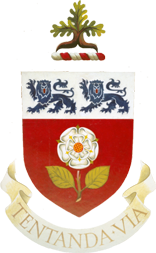
York University, also known as YorkU or simply YU, is a public research university in Toronto, Ontario, Canada. It is Canada's third-largest university, and it has approximately 53,500 students, 7,000 faculty and staff, and over 375,000 alumni worldwide. It has 11 faculties, including the Lassonde School of Engineering, Schulich School of Business, Osgoode Hall Law School, Glendon College, and 32 research centres.
Gordon McBean is a Canadian climatologist who serves as chairman of the board of trustees of the Canadian Foundation for Climate and Atmospheric Sciences. He is a professor at the University of Western Ontario and Chair for Policy in the Institute for Catastrophic Loss Reduction. Previously he was the Assistant Deputy Minister of Meteorological Service of Canada.

The University of Western Ontario is a public research university in London, Ontario, Canada. The main campus is located on 455 hectares of land, surrounded by residential neighbourhoods and the Thames River bisecting the campus's eastern portion. The university operates twelve academic faculties and schools.

Carleton University is an English-language public research university in Ottawa, Ontario, Canada. Founded in 1942 as Carleton College, the institution originally operated as a private, non-denominational evening college to serve returning World War II veterans. Carleton was chartered as a university by the provincial government in 1952 through The Carleton University Act, which was then amended in 1957, giving the institution its current name. The university is named after the now-dissolved Carleton County, which included the city of Ottawa at the time the university was founded.

The University of Windsor is a public research university in Windsor, Ontario, Canada. It is Canada's southernmost university. It has approximately 17,500 students. The university was incorporated by the provincial government in 1962 and has more than 150,000 alumni.
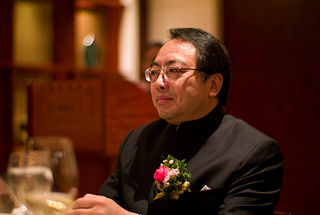
Lap-Chee Tsui is a Chinese-born Canadian geneticist and served as the 14th Vice-Chancellor and President of the University of Hong Kong.
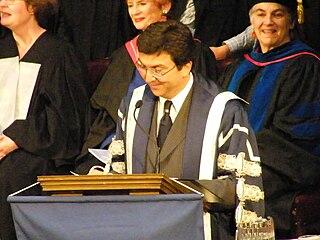
Christopher David Naylor is a Canadian physician, medical researcher and former president of the University of Toronto. He is ICES scientist emeritus and founding CEO. In 2016, he was inducted into the Canadian Medical Hall of Fame.

Grant Louis Reuber, was a Canadian economist, academic, civil servant, and businessman.

Huron University College is a university college affiliated with the University of Western Ontario in London, Ontario, Canada. It was Incorporated on the 5 May 1863. Huron is the founding institution of the University of Western Ontario.
Doreen Kimura was a Canadian psychologist who was professor at the University of Western Ontario and professor emeritus at Simon Fraser University. Kimura was recognized for her contributions to the field of neuropsychology and later, her advocacy for academic freedom. She was the founding president of the Society for Academic Freedom and Scholarship.
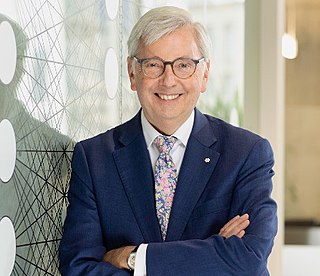
Stephen John Toope is a Canadian legal scholar, academic administrator and a scholar specializing in human rights, public international law and international relations. In November 2022, he was appointed as the fifth president and CEO of the Canadian Institute for Advanced Research (CIFAR). Prior to this, he served for five years as the 346th Vice-Chancellor of the University of Cambridge.
Douglas Northrop Jackson II was a Canadian psychology professor best known for his work in human assessment and psychological testing.

The University of Toronto Department of Mathematics is an academic department within the Faculty of Arts and Science at the University of Toronto. It is located at the university's main campus at the Bahen Centre for Information Technology.
Alan Bernstein is Professor Emeritus at the University of Toronto and President Emeritus of the Canadian Institute for Advanced Research (CIFAR), where he served as President and CEO from 2012 to 2022. A Distinguished Fellow at the Munk School of Global Affairs and Public Policy, he is also a Fellow and Member of the Standing Committee for Science Planning at the International Science Council (2022-2025). Canadian Bernstein is recognized as a leader in health research, science policy, mentorship and organizational leadership.
Daniel Ellis Berlyne was a British and Canadian psychologist. Berlyne worked at several universities both in Canada and the United States. His work was in the field of experimental and exploratory psychology. Specifically, his research focused on how objects and experiences are influenced by and have an influence on curiosity and arousal.

Located in London, Ontario, Canada, the Library and Information Science (LIS) program at the University of Western Ontario offers both Masters and PhD level programs through the Faculty of Information and Media Studies (FIMS). Its Master of Library and Information Science (MLIS) program is one of seven Canadian MLIS programs currently accredited by the American Library Association (ALA). Both the PhD and Masters programs in Library and Information Sciences at Western FIMS emphasize research skills development, engagement with professional literature, information technology learning, and professional career preparedness.
John J. Furedy was a Hungarian-born Australian and Canadian psychophysiologist and distinguished research professor of psychology at the University of Toronto, noted for his extensive empirical research into the unreliability of the polygraph test in lie detection and similar problems associated with biofeedback, as well as addressing contemporary issues concerning academic freedom.

Heterodox Academy (HxA) is a non-profit advocacy group of academics working to counteract what they see as a lack of viewpoint diversity on college campuses, especially by encouraging political diversity. The organization was founded in 2015 by Jonathan Haidt, Nicholas Quinn Rosenkranz, and Chris C. Martin.
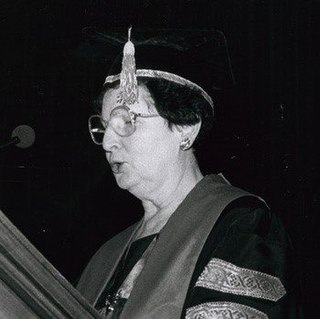
Eva Milada Ruth Kushner was a Canadian scholar of Comparative literature and French, Renaissance, and Canadian literature. She was the President of Victoria University in 1987. In 1997, she was made an Officer of the Order of Canada. She was the first woman to be a university president in Ontario, Canada.













